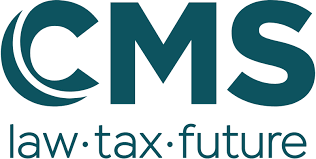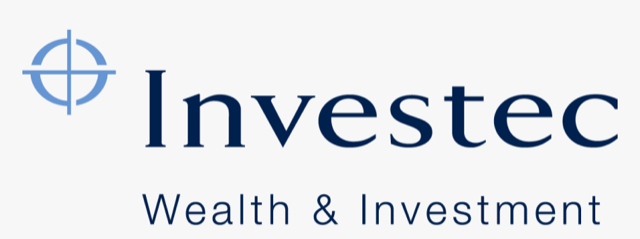Mike Southon’s Whole Life Story
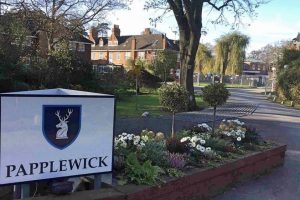
Papplewick School in Ascot.
From 1961 to 1967 I went to Papplewick School in Ascot, where one of my contemporaries was Richard Curtis (whatever happened to him?) I left there with no science education at all (Chemistry, Physics or Biology), but nearly fluent in Latin.
I then to Wellington College in Crowthorne, where Chris West was my best friend. We met in 1967, outside the headmaster’s study, on our first day there.
I had a relatively happy time, considering the unpleasant nature of British public-school boarding in the 1960s. My first housemaster was James Wort, who was definitely my first Mentor. He was a lovely man. His first words were “You should go down to work the theatre – you’ll enjoy it”. I’ve been in show business, one way or another ever since – thanks James!
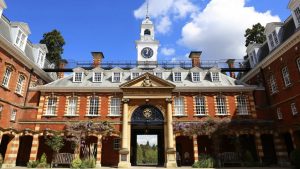
Wellington College. If it looks familiar, it is the location for Kensington Palace in the Netflix show The Crown. They should really put in cut-outs of Princess Margaret and Lady Diana in the windows, just for fun!
I left in 1971, then did a hugely enjoyable pre-university Apprentice Training Scheme at Leyland Motors, the truck and bus division of British Leyland.
I then went to Imperial College to read Mechanical Engineering but got thrown out after one year, for having fun in London with my new friends, rather than going to lectures.
I then had a few lab-type positions, culminating in one of the best jobs I ever had, working for Tate & Lyle Research in Reading, turning sugar into detergents. I was particularly good at making washing powder.
About that time, Chris wangled me into an Oxford undergraduate Dixieland Jazz band called ‘The Oxcentrics’. I was never at the university itself, though Chris was at the Poly (now Oxford Brookes University) at the time. Fronting The Oxcentrics was a complete hoot – we did dozens of May Balls and I got into all sorts of scrapes. I was the singer/compère, and my stage name was Gorgeous Mike Vaseline.
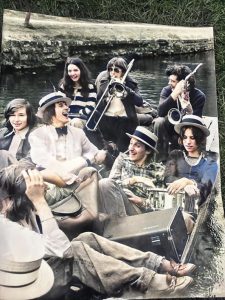
Recently colorised photo of the Oxcentrics on May Morning 1976. I’m in the white tuxedo, Chris West is to my left.
You can find details of the Oxcentrics here: http://en.wikipedia.org/wiki/Oxcentrics
Chris and I also ran a mobile disco in the 70s called The Piglet Productions Roadshow with Mike Gould (who founded it) and Graham Michelli, another mate from school.
Around 1977 all my pals were leaving Oxford and I felt it time for a change of career. Fortunately, my second Mentor, Dr Mike Inkson, suggested going to The University of Bradford to read Chemical Engineering and Management Economics.
I can highly recommend going to University at the age of 24 – you have much more idea of what you really want to do and are more focused. For example, this time I actually went to lectures.
I decided to try my hand at acting, but lack of any genuine talent meant auditions for the university drama group were mostly unsuccessful. I formed a revue company, which eventually contained local professionals, including Ian Bleasdale who plays ‘Josh’ in Casualty. We eventually toured a show called The Perils of Arnold Hardstaff every Fresher’s’ week for ten years.

The University of Bradford. A very fine place!
It was while doing these theatre shows that I met Mike Banahan and Andy Rutter, who were the same age as me but by then were computer science lecturers at the university. After a loss-making visit by the University Drama group to the Edinburgh Fringe, Mike Banahan and I went to Edinburgh to see if we could do a deal at a central venue, by offering free technical support (sound and lighting) for all the shows in the venue in exchange for two daily slots, lunchtime and evening.
They agreed, so we went to the Fringe in 1980 with another show I wrote called Delusions of Grandeur and performed at St Columba’s by the Castle. Mike was in charge of the technical production for all the shows in the venue and Andy Rutter drove the van and worked on many of the shows.
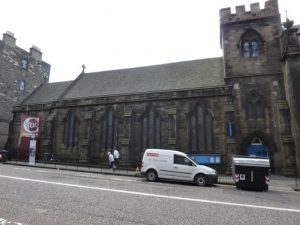
St Columba’s by the Castle, Edinburgh
Our evening performance was specifically timed to catch the outgoing crowd from the Tattoo, so we were sold out every night and made a tidy profit! In retrospect, this was my first foray into entrepreneurship, with the same people with whom I was later to start a very successful computer services company.
I scraped a 2:2 at Bradford, and then started working in the construction industry, building oil refineries, or, more specifically, wandering around with a clip-board while skilled men did the actual work.
I eventually became site manager on a 150-person project, though it was rather like the 21-year-old officer nominally in charge of a platoon, who, if he has any sense, listens to the 40-year-old Sergeant Major for the important stuff, like how not to get everyone killed.
A recession then hit, and the bottom fell out of the market. I was reassigned to selling scaffolding – but given no formal sales training. This did not go well.
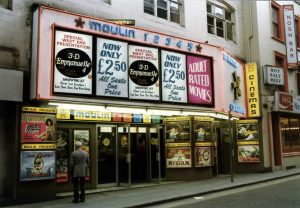
Mike and I worked in this first-floor office (not in the cinema).
On a visit to my old university pub in Bradford, The Shearbridge, Mike Banahan told me that he and Andy had written a book about UNIX (UNIX: The Book) and were doing freelance training for a company in Soho.
I managed to secure a sales job there and soon persuaded Mike to join full time. We might still be there had not another person joined, Pete Griffiths, the original Beermat Entrepreneur, who suggested we start our own company.
Mike, Pete and I co-founded The Instruction Set in January 1984. Andy Rutter joined six months later and Pete’s brother Dave, an alumnus of Goldman Sachs, six months after that.
In retrospect, more by luck than judgment, this was an ideal team – a bit like The Beatles plus Brian Epstein. Five years later we had 150 employees in the UK and USA (I co-founded an office in Boston with our finance manager, Rick Medlock), and a turnover of £7.5M.
We had no outside capital (sorry to any Venture Capitalists out there) – and the five of us each had 20%. We were profitable every month of operation (except one) and cash-positive from month six.
It was at The Instruction Set that I finally learned about the process of selling.
Most successful salespeople get along at first with natural charm, hard work and a good slice of luck. When we hired a telesales team to sell our training courses, we realised that we had to rally understand the process of sales and sales management.
We booked a sales training workshop with a leading training company, and a very nice man, Simon Hawken, delivered a fantastic event covering every aspect of sales, ‘from soup to nuts’ as the expression goes. In fact, we liked the course so much that we hired Simon to be Sales Manager, while I continued flying around the world charming (mostly) nice people in exotic locations.
I’ve never forgotten that first real sales training session, and over the years learned more and more, finally turning this accumulated knowledge into Sales on a Beermat. The business kept on growing, and eventually, we got an offer we couldn’t refuse and sold it in 1989 to Hoskyns (now part of Capgemini).
If anyone out there is considering a trade sale, please ask me for advice. It was a very difficult time for me. Six weeks post-sale I was depressed, felt guilty and wished I could give the money back. I learned then that money itself does not make you happy, even if it does make misery more comfortable….
30 years later, the Hoskyns/Instruction Set acquisition is now regarded as a model example, with many of our former employees still working there. Others are senior executives/partners in big companies, and a few started businesses that ultimately were much more successful than The Instruction Set.
We often have reunions and people fly over from the USA and Australia to be here, which made me very proud of the company I co-founded. We usually meet in The Fox on the Green (then called The Slug and Lettuce) in Islington, where we made the announcement to the staff on the first floor.
We had a two-year earn-out, so I left in 1991. I retired, and then returned to work three months later, bored. I wanted to do something that was fun, so I decided to start a band and run it as a business.
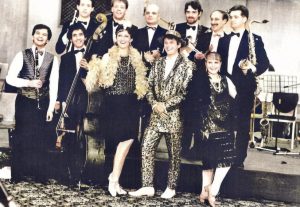
Recently colourised photo of The Oxcentrics, featuring the tapdancing Sparke Sisters (Sally Jones and Karen Whalley) at the Albert Hall for The Mandair Ball 5th November 1987. (Note Chris West had a moustache in those days!). The headline act was Gary Glitter (!)
Original clarinet player Oliver Weindling re-formed The Oxcentrics, with Chris West on drums and myself as vocalist/front man Gorgeous Mike Vaseline. Oliver sourced some fabulous jazz players, mostly members of Loose Tubes, including Ashley Slater (Freakpower/Fatboy Slim), Mark Lockheart, John Eacott, Mark Bassey, Robin Aspland, John Maul and occasionally Django Bates, Billy Jenkins and the Argüelles brothers.
We expanded the repertoire through swing, jump-jive to rock and roll. However, my first love was sixties music, and, inspired by the success of the new Oxcentrics, I formed The Coffee Machine which swiftly migrated to ‘Mike Fab-Gere and the Permissive Society’.
Mike Fab-Gere, with his wig, shades and Afghan coat became a popular performer on the college circuit in the early 1990s. Looking back, we were one of the original ‘tribute bands’, introducing a new generation to the music of The Beatles, The Kinks, The Stones (and so on).
It also enabled me to work with some amazing musicians such as from left in picture Steve Rodford, Mark Birch, Bob Skeat and Andy Nye, as well as ‘deps’ (stand-in musicians) who had worked with Iron Maiden, Deep Purple and The Zombies.
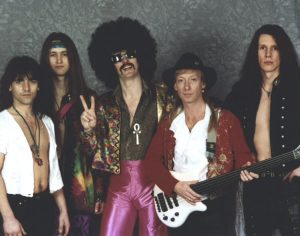
Mike Fab-Gere and The Permissive Society, 1991. I’m the one with the big hair.
One of the best Entertainments Managers on the circuit was Ricky Gervais, who booked me several times to play at University College London. I still bump into him from time to time in Hampstead, where we both live.
There is a basic Mike Fab-Gere site here: www.fabgere.com
If you want to experience the fun we had then my 90s-era show reel is here, featuring live footage and various TV appearances, including This Morning with Richard and Judy. https://www.youtube.com/watch?v=Ek8_6huES1w
I also toured major regional theatres with a show called Freak Out! which also starred David Bowie lookalike John Mainwaring from Jean Genie, and often Marc Bolan lookalike Danielz from T-Rextasy.
When I was getting a bit fed up with life on the road, I began to listen seriously to requests from my chums for help with their start-ups.
Since then, I’ve worked on about 25 start-ups, some just helping out a mate for 6 months, others serious ventures that eventually went public.
Of these, perhaps the most interesting was a company called RiverSoft. Among the many things I learnt there was the value of mentoring – courtesy of Sir Campbell Fraser, who was our chairman. The section in The Beermat Entrepreneur about Mentoring is based on him. Every bit of advice gave me was excellent. He died in 2007, and I still miss him.
RiverSoft went public for a huge sum. Others of the 25 eventually went bust. Such is entrepreneurship. I learnt lots from both.
I became a visiting lecturer at Cass Business School, and my talks gradually migrated from ‘Open Systems Technology’ to ‘Horror Stories From The Start-Up World’.
Another Mentor, Martin Rich at Cass, suggested I write a book, but I did the sensible thing and found a proper author, my old school chum Chris West, who in the interim had published a book about his backpacking experiences in China in the 1980s.
He turned my unstructured ramblings and weird life experiences into a rigorous methodology for turning a good idea in a pub to a great business: The Beermat Entrepreneur, published in 2002.
We had plenty of hope but no real expectations when the book came out, but it hit the Zeitgeist, and has gone on to sell 100,000 copies in the UK, which is outstanding for a business book. Beermat also appeared in local language editions in The Netherlands, Spain Japan, Russia, China, Thailand, Lithuania, Indonesia and Romania.
On the back of it, Chris and I found ourselves working with a range of organisations to help entrepreneurship, both in the community and within large corporates. Among my gigs were Entrepreneur for the City of Liverpool and Entrepreneur Mentor for Aylesbury Vale District Council.
The Boardroom Entrepreneur (about how to be entrepreneurial in a large organisation) was released in March 2005 and Sales on a Beermat in August 2005.
Chris then wrote Finance on a Beermat with finance experts Stephen King and Jeff Macklin, released in March 2006. Finally, Chris wrote Marketing on a Beermat based on his own knowledge and experience, and this was released in 2008.
Chris has since written many books, including a social history of the UK, based around stamps (First Class), and Eurovision! A History of Modern Europe Through the World’s Greatest Song Contest. The latter is a really, really good book, and he’s often on TV and radio at Eurovision time – douze points for this one!
His latest book The Next Big Thing looks at the history of British politics from 1906 and, by drawing analogies from the history of science, shows that there is a regular pattern behind the rise and fall of governments.
Never has a book been more perfectly timed, given the dismal place where we currently find ourselves!
More at: www.chriswest.info
Since the publication of Beermat, I have followed Sir Campbell’s inspiration and like to mentor entrepreneurs. My advice is always free, and I don’t take stakes in the businesses. I reckon I have done over 3000 face-to-face mentoring sessions.
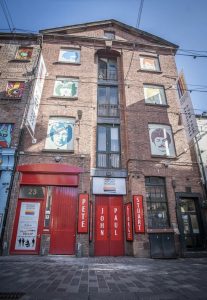
The Liverpool Beatles Museum, Mathew Street.
I also do a lot of public speaking at events all over the world. Speaking looks easy, but is actually an art. I reckon I am now extremely good, but I’m still learning. I think I always will be. Great speakers I have seen include Malala Yousafzei, Stephen Fry and improvisational guru Neil Mullarkey.
I developed a talk based on one of the UK’s most successful entrepreneurs: The Beatles. Their story mirrors that of many great start-ups: a complex, charismatic entrepreneur (Lennon) assembles an amazing team (including an outstanding mentor), comes up with world-beating products, then egos start getting out of control…
My Beatles credentials started with being a fan as a teenager. I saw A Hard Day’s Night and thought ‘I want to be like that!’ Later, I spent much time researching the band in Liverpool. This led me to The Casbah Coffee Club, where The Beatles had played before The Cavern. There I met original Beatle Pete Best and his brother Roag. I was thrilled to be at the launch in July 2018 of Roag and Pete’s new enterprise The Liverpool Beatles Museum, Mathew Street, featuring some of his eye-watering collection of previously unseen Beatles memorabilia.
Another mentee from my Liverpool days was Chris Carline, the grandson of legendary Liverpool Manager, Bill Shankly. He now runs The Shankly Hotel, which again features fascinating memorabilia and is one of the highest-grossing hotels in the city.
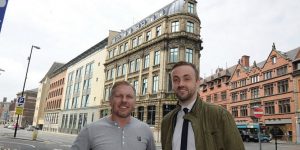
Chris Carline (right) outside The Shankly Hotel in Liverpool with co-founder Lawrence Kenwright.
As well as being centre stage as a speaker, I enjoy interviewing entrepreneurs live and getting them to tell their stories. I have been lucky enough to do this with some amazing people, including Sir Richard Branson (five times), Bob Geldof KBE, Karren Brady, Jacqueline Gold, Baroness Mone and Lord Digby Jones.
I’ve also been using the material in The Boardroom Entrepreneur to help local authorities become profitable social enterprises. More information on that here: http://www.mikesouthon.com/entrepreneurship-in-local-authorities/
Today, we have a brand-new version of The Beermat Entrepreneur, correcting a few things we didn’t quite get right last time, but mainly incorporating everything I’ve learned in 16 years of mentoring. The business world has changed radically since 2002, but the fundamental principles and psychology of it all have not.
You can find more details of the book here: www.beermat.biz and can order it on Amazon here: https://tinyurl.com/NewBeermat
From 2019 to 2022 Chris and I delivered two 11-week modules, Introduction of Entrepreneurship and Marketing Strategy to many hundreds of second year undergraduate Business Management and Finance Students at Bayes Business School, part of City, University of London.
We brought in special guests every week, including experts from our Beermat Partners CMS Law, Investec Wealth and Investment, AKQA and Caxton.

London Business Journal
I ran over 200 6-person tutorials each semester and provided one-on-one mentoring for hundreds of students. I know many of them will go on to be billionaires with a good moral compass who will change the world.
I am now Editor at Large for the London Business Journal – www.londonbusinessjournal.co.uk, where I’ll be doing profile pieces on business people and entrepreneurs, as well as providing thought leadership columns.
If this is of interest, please e-mail me at mike@mikesouthon.com or WhatsApp me on 07802 483834
AND FINALLY
I often tell people that the key success factor for any entrepreneur is their ability to find, and then retain mentors. We explain how to do this in the book.
When I’m mentoring, I answer three main questions: how? who? and why?
- How do I… Sell more (a very common question), speak in public, build a team (etc.)
- Who could help me with my entrepreneurial enterprise, or buy my products and services?
- Why am I doing this?
At first, it’s about making money. Later, it’s about being rich and happy, which is closely linked to having created useful goods or services and having built a business around them in a manner that was hard but essentially ethical.
I often quote Sir Paul McCartney from The Beatles track The End on the last album they recorded Abbey Road: “And in the end, the love you take is equal to the love you make.”
If you would like half an hour’s free mentoring at The British Library, please drop me an e-mail: mike@mikesouthon.com
Top Tip: the shorter the e-mail you send, the quicker the reply you’ll get!


